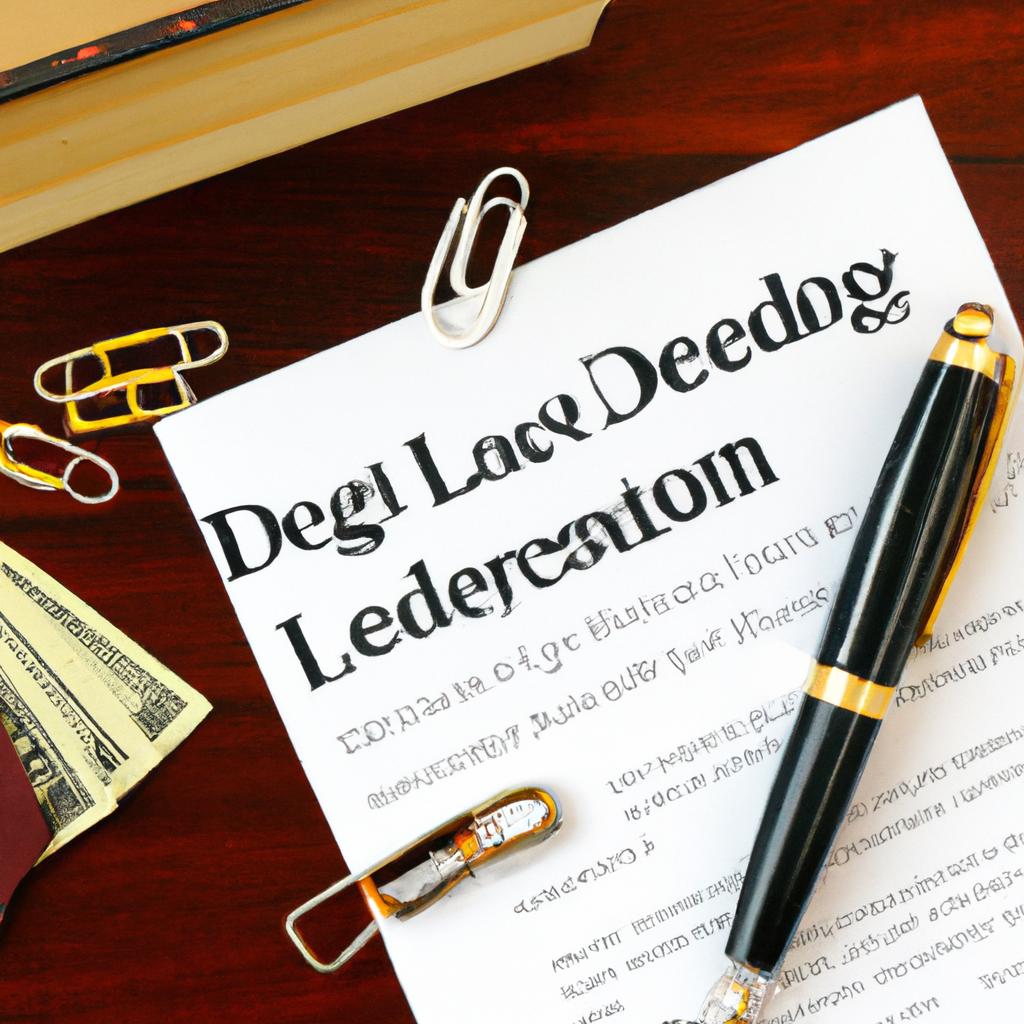Navigating the complex world of real estate ownership requires a keen understanding of legal terminology, processes, and documentation. One crucial document that solidifies ownership of a property is the deed. In this article, we will delve into the intricacies of acquiring a deed for your house, outlining the essential steps and considerations involved in this important legal process. As experienced lawyers at Morgan Legal Group in New York City, we specialize in estate planning, probate, elder law, Wills, and trusts, making us well-equipped to guide you through the deed acquisition journey with precision and expertise.
Acquiring the Deed: Understanding the Legal Process
After going through the exciting process of finding your dream home, it is crucial to understand the legal steps involved in acquiring the deed for the property. The deed is a legal document that transfers ownership of the property from the seller to the buyer. It is essential to have a clear understanding of this process to ensure a smooth and successful transaction.
- Ensure all terms of the purchase agreement are met
- Prepare the necessary legal documents
- Submit the documents to the appropriate authorities for recording
- Receive the deed and confirm ownership transfer
Obtaining the deed for a house involves a series of legal steps that must be followed diligently. It is advisable to seek the assistance of a qualified real estate attorney who can guide you through the process and ensure all legal requirements are met. By understanding the legal process of acquiring the deed, you can avoid potential pitfalls and protect your investment in the property.
| Key Points | Importance |
|---|---|
| Meeting purchase agreement terms | Ensures transaction completion |
| Proper document preparation | Legal protection |
| Deed recording | Official ownership transfer |

Navigating the Documentation: Requirements for Obtaining a Deed
To obtain a deed for a house, there are specific requirements and documentation that must be navigated carefully. The first step in the process is to ensure that you have a valid and legally binding contract for the purchase of the property. This contract should outline the terms of the sale, including the purchase price, closing date, and any contingencies that must be met before the sale can be finalized.
Once the contract is in place, the next step is to conduct a title search to verify that the seller has legal ownership of the property and that there are no outstanding liens or judgments against it. This search is crucial in establishing clear title to the property and avoiding any potential legal issues in the future. Additionally, obtaining a survey of the property can help to identify any boundary disputes or encroachments that may affect the sale. By carefully navigating these documentation requirements, you can ensure a smooth and legally sound transfer of ownership for your new property.
Securing Ownership: Steps to Transfer Property Title
Owning a property comes with the responsibility of securing ownership through the proper transfer of property title. To ensure a smooth process, it is important to follow the necessary steps to obtain the deed for your house. Here are some key steps to transfer property title:
- Verify Current Ownership: Before initiating the transfer of property title, it is crucial to verify the current ownership status of the house. This can be done by obtaining a copy of the current deed from the county recorder’s office.
- Prepare and Execute Deed: Once ownership has been verified, the next step is to prepare the necessary deed transfer documents. This involves drafting a new deed that clearly states the transfer of ownership from the current owner to the new owner. The deed must be signed and notarized by all parties involved in the transfer.

Properly Executing the Deed Transfer: Best Practices and Considerations
In order to properly execute a deed transfer for a house, there are several best practices and considerations that individuals must keep in mind. The process of transferring a deed is a crucial step in real estate ownership and should be approached with care and attention to detail. Here are some key points to consider when navigating the deed transfer process:
- Verify the current owner’s legal right to transfer the property
- Ensure the deed is properly drafted and executed in accordance with state laws
- Record the deed with the appropriate county office to make the transfer official
- Consider hiring a real estate attorney to guide you through the process and provide legal advice
Properly executing a deed transfer is essential to ensuring a smooth and legally binding transaction. By following these best practices and considerations, individuals can successfully transfer ownership of a house with confidence and peace of mind.
Q&A
Q: What is a deed and why is it important when buying a house?
A: A deed is a legal document that proves ownership of a property. It is important to have a deed when buying a house to establish clear ownership rights.
Q: How do I obtain a deed for my house?
A: To obtain a deed for your house, you will need to have it transferred from the seller to you through a legal process involving a change of ownership.
Q: What are the different types of deeds?
A: There are several types of deeds, including warranty deeds, quitclaim deeds, and special warranty deeds. Each type of deed has different implications for the buyer and seller.
Q: Do I need a lawyer to help me get a deed for my house?
A: It is not always necessary to hire a lawyer to help you get a deed for your house, but it can be helpful to have legal guidance to ensure that the transfer is done correctly and all legal requirements are met.
Q: Can I sell a house without a deed?
A: In most cases, you cannot sell a house without a deed, as the deed is the legal document that proves ownership of the property. It is crucial to have a deed in order to transfer ownership to a new buyer.
Q: What should I do if I have lost the deed to my house?
A: If you have lost the deed to your house, you can request a copy from the county clerk’s office where the property is located. It is important to keep a copy of the deed in a safe place to avoid losing it in the future.
The Way Forward
Now that you have learned how to obtain a deed for your house, you are one step closer to securing your ownership and protection of your property. Remember to follow the necessary steps and seek legal guidance if needed to ensure a smooth and successful process. With your deed in hand, you can enjoy the peace of mind that comes with knowing that your home truly belongs to you. Good luck on your journey towards home ownership!
 Unlocking the door to your dream home is an exciting and fulfilling milestone in life. However, before you can truly call a house your own, you must have the proper legal documents to prove your ownership. One of the most crucial documents in homeownership is the deed to your house. This document serves as proof that you are the rightful owner of the property and outlines the legal details of your ownership. In this article, we will discuss everything you need to know about how to get a deed for a house, including the steps, benefits, and practical tips.
Unlocking the door to your dream home is an exciting and fulfilling milestone in life. However, before you can truly call a house your own, you must have the proper legal documents to prove your ownership. One of the most crucial documents in homeownership is the deed to your house. This document serves as proof that you are the rightful owner of the property and outlines the legal details of your ownership. In this article, we will discuss everything you need to know about how to get a deed for a house, including the steps, benefits, and practical tips.
What is a deed for a house?
A deed for a house is a legal document that confirms the transfer of ownership from one party to another. It outlines the rights, privileges, and responsibilities of the property’s new owner and serves as proof of ownership. A deed is typically created and signed during a real estate transaction, such as buying a house or gifting a property, and is recorded with the county or state government.
How to get a deed for a house?
Now that you have a basic understanding of what a house deed is let’s dive into the process of obtaining one. Follow these simple steps to get a deed for your house:
1. Hire a real estate attorney or closing agent: The first step in obtaining a deed for your house is to hire a real estate attorney or a closing agent. These professionals have the knowledge and expertise to guide you through the legal process and ensure that all necessary paperwork is completed accurately. They can also help you with any questions or concerns you may have about the deed or your ownership rights.
2. Obtain a copy of the current deed: To create a new deed, you will first need to obtain a copy of the property’s current deed from the county clerk’s office. This will serve as a reference for the legal description of the property and any existing encumbrances, such as mortgages or liens.
3. Determine the type of deed you need: There are different types of deeds, such as warranty deeds, quitclaim deeds, and grant deeds. Your attorney or closing agent can help you determine which type of deed best suits your situation and provide guidance on what needs to be included in the deed.
4. Complete the new deed: Once you have gathered all the necessary information and determined the type of deed you need, your attorney or closing agent will prepare the new deed. This typically involves filling out the necessary forms, including the legal description of the property, names of the old and new owners, and any relevant signatures.
5. Have the deed notarized and signed: Once the new deed is completed, it needs to be notarized and signed by both the old and new owners. This is usually done in the presence of a notary public to ensure the legality of the transaction.
6. File the deed with the county or state government: Once it is notarized and signed, the new deed must be filed with the county or state government. This makes the transfer of ownership official and protects both parties in case of any future disputes.
What are the benefits of getting a deed for a house?
Obtaining a deed for your house comes with several benefits, including:
1. Proof of ownership: Having a house deed serves as solid proof that you are the rightful owner of the property. This can come in handy in situations where you need to prove ownership, such as applying for a loan or selling the house.
2. Protection of rights: A deed outlines your ownership rights and any restrictions that come with it. This ensures that you are aware of your responsibilities as a property owner and protects you from any potential disputes in the future.
3. Peace of mind: Once you have a deed for your house, you can rest easy knowing that you have legally secured your ownership rights. This can bring you peace of mind and eliminate any doubts or concerns about the ownership of your property.
Practical tips for obtaining a deed for a house
1. Hire a reputable attorney or closing agent: When getting a deed for your house, it is crucial to work with a reliable and experienced real estate attorney or closing agent. They will ensure that all legal aspects are taken care of and give you peace of mind throughout the process.
2. Double-check all information: Make sure to double-check all the information on the new deed before signing it. Any mistakes or omissions can cause delays or legal issues in the future.
3. Keep a copy for your records: Once you have the new deed, make sure to keep a copy for your records. This will serve as proof of your ownership and can also come in handy in the case of a lost or misplaced deed.
Conclusion
Obtaining a deed for your house is an essential step in officially becoming a homeowner. It serves as proof of your ownership and outlines your rights and responsibilities as a property owner. By following the steps outlined in this article and working with a reputable attorney or closing agent, you can ensure a smooth and hassle-free process of getting a deed for your house.






